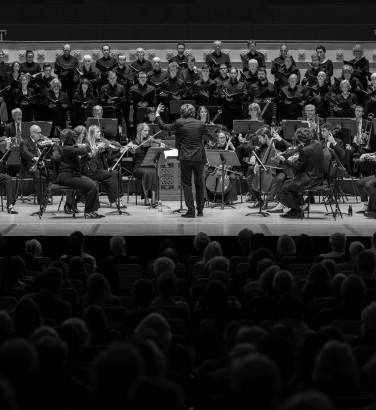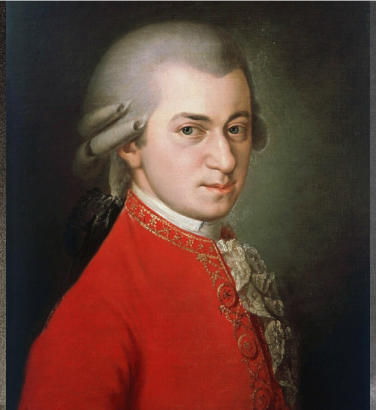
Rock musicians and classical music: a brief history
13 Mar 2023
News Story
From left to right: Freddie Mercury, Jonny Greenwood and Paul McCartney
The phenomenon of classically-inflected music written by musicians from other genres is far from a recent one. Radiohead's Jonny Greenwood - whose Water is available to view from 6 April to 6 May as part of our Digital Season - follows in a legacy which actually goes back further than the birth of rock to the dawn of the Jazz Age, a century ago, when one of its most ambitious composers hoped to bolster his credentials with some rigorous study.
This was George Gershwin, who was promptly turned down by both Nadia Boulanger and Maurice Ravel, the latter asking why a first-class Gershwin would want to be a second-rate Ravel. Gershwin’s genius shone through regardless: he went on to fuse his own jazz-influenced idiom to classical structures so successfully that An American in Paris and Porgy and Bess remain difficult to classify to this day.
A few decades later, Duke Ellington started to venture beyond the confines of the big band music with which he was associated to write film scores, gaining a Best Score nomination at the 1961 Oscars for Paris Blues. Within four years, he had given the first of his Sacred Concerts, a set of works he would come to regard as “the most important thing I’ve done”. His style may not have veered as closely to the classical as Gershwin, but his talents as a composer were such that, by the 1930s, he had been declared by Percy Grainger to be one of the greatest, alongside Bach and Delius.
Fast forward to 1988 and the excesses of the decade took form in Freddie Mercury’s Barcelona – not just a song but an entire album he recorded with Montserrat Caballé. This marked the culmination of his passion for opera, obvious to anyone who had heard Queen’s Bohemian Rhapsody on its release in 1975. His own voice is not always a seamless blend with the latter’s soprano, but it is hard to deny his enthusiasm and ambition. If the whole enterprise seems a bit over-the-top, it’s very much in keeping with opera as a genre, not to mention Mercury’s own personality.
Paul McCartney – no stranger to cross-genre fertilisation since his days in the Beatles – first ventured into the classical realm in 1991, when his Liverpool Oratorio (written in collaboration with Carl Davis) was premiered with a stellar cast including Kiri Te Kanawa and Willard White. He has released a further four classical albums, the most recent of which, 2011’s Ocean’s Kingdom, was in response to a commission from the New York City Ballet.
It’s something I would suggest you play once the sun sets, for its hypnotic drone-like structure presents something that really works best as daylight fades away.
By then, classical music had become the (perhaps unlikely) subject of a reality TV show with the broadcast of the BBC’s 2008 series Maestro, in which eight celebrities tried their hands at conducting. The comedian Sue Perkins emerged as the winner (and has gone on to have a side career as a conductor), but from a creative perspective, the runner-up Goldie arguably benefitted even more. Having already made his mark across several artistic disciplines, he added composition to his roster with Sine Tempore, a commission for the 2009 BBC Proms. He may not have written anything else in the classical realm, but the experience has clearly coloured his artistic endeavours since.
And so we come to Jonny Greenwood who, with Messiaen and Penderecki among his formative influences, can hardly be considered mainstream. His film scores – nine of them to date – have met with particular acclaim, and he has written a number of concert works alongside these, displaying an interest in unusual instruments throughout. Just as Saint-Saëns had used the eerie sound of the glass harmonica to depict an aquarium in Carnival of the Animals, so Greenwood’s Water, written during his 2014 residency with the Australian Chamber Orchestra, employs a pair of tanpura – plucked stringed instruments of Indian origin – to add an unusual dimension to his sonic landscape. It all adds up to a gentle piece recreating the rippling of light in water in textures that are at once otherworldly and reassuring.

Digital Season 2022/23: Jonny Greenwood Water
The final performance in our 2023/24 Digital Season is a gentle, reflective work - available for one month from 6 April.
Related Stories
![]()
Haydn's lost joke
1 April 2025
Could there be more to the Farewell Symphony than meets the eye?![]()
2025/26 Season highlights
20 March 2025
Don't know where to start with the new Season? We have a few starting points for you.![Three men, the first two in 18th century formal dress (one in black and white, one in a red coat), the last in an old photo, smoking]()
What is a sinfonia concertante?
17 March 2025
We delve into the history of a hybrid genre ...


